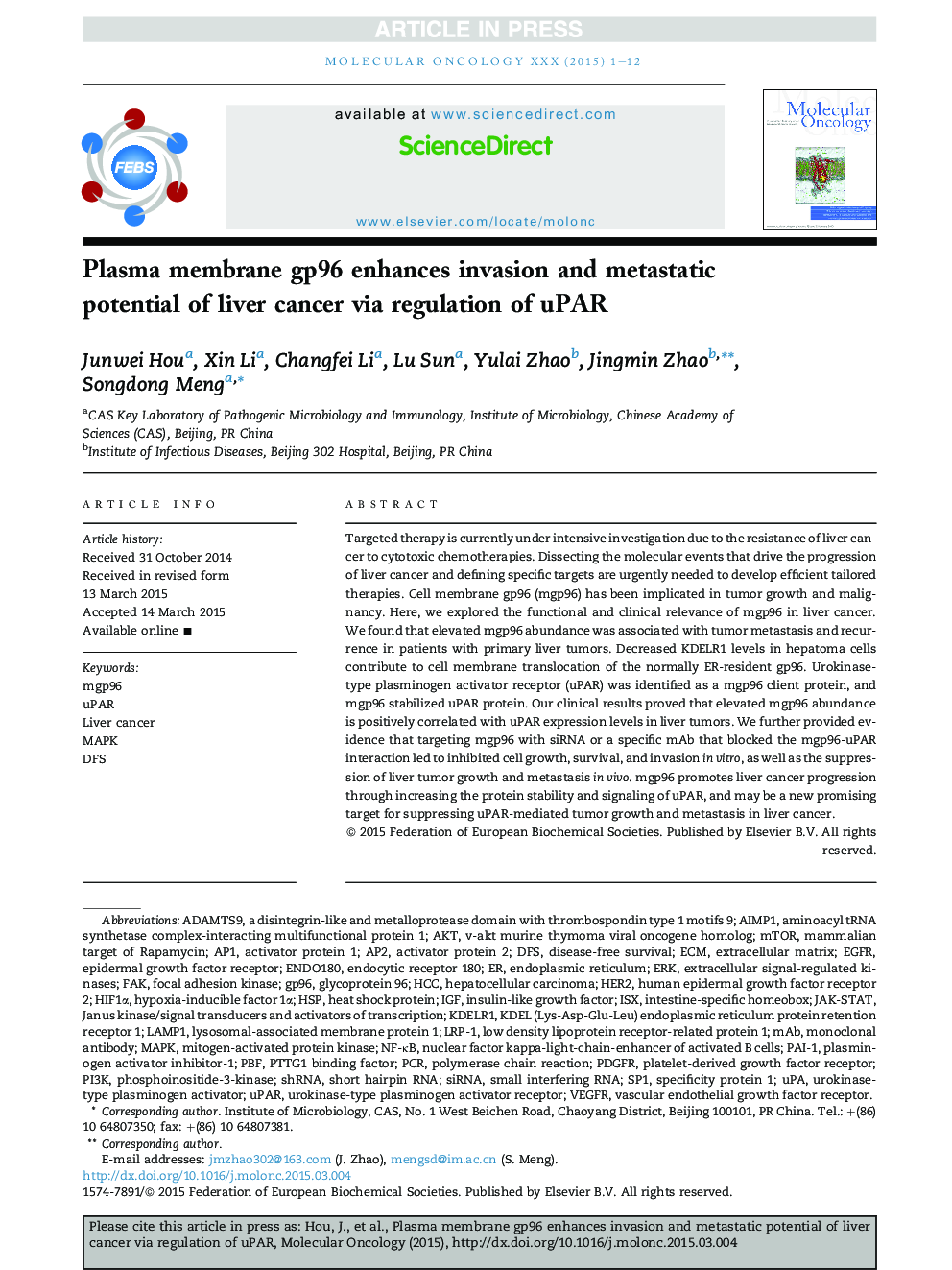| Article ID | Journal | Published Year | Pages | File Type |
|---|---|---|---|---|
| 10914652 | Molecular Oncology | 2015 | 12 Pages |
Abstract
Targeted therapy is currently under intensive investigation due to the resistance of liver cancer to cytotoxic chemotherapies. Dissecting the molecular events that drive the progression of liver cancer and defining specific targets are urgently needed to develop efficient tailored therapies. Cell membrane gp96 (mgp96) has been implicated in tumor growth and malignancy. Here, we explored the functional and clinical relevance of mgp96 in liver cancer. We found that elevated mgp96 abundance was associated with tumor metastasis and recurrence in patients with primary liver tumors. Decreased KDELR1 levels in hepatoma cells contribute to cell membrane translocation of the normally ER-resident gp96. Urokinase-type plasminogen activator receptor (uPAR) was identified as a mgp96 client protein, and mgp96 stabilized uPAR protein. Our clinical results proved that elevated mgp96 abundance is positively correlated with uPAR expression levels in liver tumors. We further provided evidence that targeting mgp96 with siRNA or a specific mAb that blocked the mgp96-uPAR interaction led to inhibited cell growth, survival, and invasion in vitro, as well as the suppression of liver tumor growth and metastasis in vivo. mgp96 promotes liver cancer progression through increasing the protein stability and signaling of uPAR, and may be a new promising target for suppressing uPAR-mediated tumor growth and metastasis in liver cancer.
Keywords
AP1mTORFAKERKDFSHspAP2PAI-1uPAuPARLRP-1VEGFRECMJAK-STATPDGFRPBFgp96HIF1αActivator protein 2Aimp1ISXEndo180ADAMTS9shRNAEGFRNF-κBPI3KHER2LAMP1IGFmAbHCCMAPKSmall interfering RNAshort hairpin RNAsiRNASp1v-akt murine thymoma viral oncogene homologMonoclonal antibodyAktdisease-free survivalLiver cancerendoplasmic reticulumhypoxia-inducible factor 1αInsulin-like growth factornuclear factor kappa-light-chain-enhancer of activated B cellsphosphoinositide-3-kinaseurokinase-type plasminogen activatorExtracellular matrixSpecificity protein 1Plasminogen activator inhibitor-1mammalian target of rapamycinpolymerase chain reactionPCRHeat shock proteinLysosomal-associated membrane protein 1activator protein 1Low density lipoprotein receptor-related protein 1mitogen-activated protein kinasejanus kinase/signal transducers and activators of transcriptionHepatocellular carcinomaextracellular signal-regulated kinasesfocal adhesion kinaseHuman epidermal growth factor receptor 2platelet-derived growth factor receptorvascular endothelial growth factor receptorEpidermal growth factor receptorUrokinase-type plasminogen activator receptor
Related Topics
Life Sciences
Biochemistry, Genetics and Molecular Biology
Cancer Research
Authors
Junwei Hou, Xin Li, Changfei Li, Lu Sun, Yulai Zhao, Jingmin Zhao, Songdong Meng,
